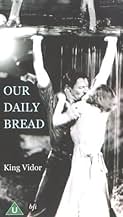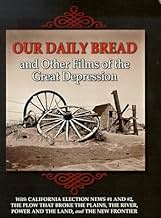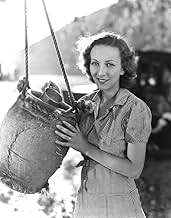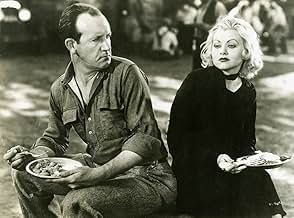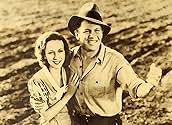PUNTUACIÓN EN IMDb
7,0/10
2,3 mil
TU PUNTUACIÓN
A un matrimonio le ceden una finca para cultivar, como no saben nada, deciden crear una cooperativa para compartir el trabajo.A un matrimonio le ceden una finca para cultivar, como no saben nada, deciden crear una cooperativa para compartir el trabajo.A un matrimonio le ceden una finca para cultivar, como no saben nada, deciden crear una cooperativa para compartir el trabajo.
- Dirección
- Guión
- Reparto principal
- Premios
- 1 premio en total
C.E. Anderson
- Schultz
- (sin acreditar)
Earl Askam
- Farmer
- (sin acreditar)
Lionel Backus
- Barber
- (sin acreditar)
Eddie Baker
- Deputy Sheriff
- (sin acreditar)
Jack Baldwin
- Motorcyclist
- (sin acreditar)
Marion Ballou
- Old Lady
- (sin acreditar)
Reseñas destacadas
OUR DAILY BREAD (United Artists, 1934), directed by King Vidor, is a follow-up/sequel to Vidor's own 1928 silent drama, THE CROWD (MGM, 1928) starring James Murray and Eleanor Boardman as the typical American couple, John and Mary Sims. In this sound go-round production, Tom Keene and Karen Morley, who somewhat resemble the original portrayers, step in as John and Mary Sims.
This time the setting takes place during the hard times of the Great Depression. John and Mary live in an apartment (possibly New York City) struggling to survive their daily existence. John searches high and low for any kind of job while Mary manages to talk the landlord into giving them a little more time to come up with the rent money. Hoping that their visiting Uncle Anthony (Lloyd Ingraham) can submit them a loan until John can obtain work, it is learned after a dinner that Uncle Anthony hasn't the funds to help them nor himself. The Stock Market had gotten to him, too. However, he offers the couple an old farm in the country that he doesn't want. Although John and Mary know nothing about farming, they accept his offer. It's only after John comes upon Chris (John Qualen), a destitute Swedish farmer whose truck has broken down, that John hires him as his farmhand. John then comes up with a great idea starting a commune for other depression victims to lend a helping hand, ranging from carpenters to blacksmiths. The farming community, with John as their leader, becomes a thriving success. Of the residents in the community, Louie (Addison Richards), helpful as a tractor driver, is very mysterious, especially when keeping only to himself. After the arrival of Sally (Barbara Pepper), a blonde floozy, she not only plays her radio music loud enough to hear in the next town, but arouses enough attention from John to go away with her. Situations arise when farm animals and crops of corn are dying due to a serious drought.
OUR DAILY BREAD is an interesting look of an American people of the Depression era striving together, uniting as one, with a positive outlook in life regardless of how dark things become. A forerunner to the now famous John Steinbeck novel, THE GRAPES OF WRATH (which later became a classic 1940 motion picture starring Henry Fonda, with John Qualen playing a strong supporting role, minus his Swedish accent), in a story about farmers losing their land and driving cross-country to fight unemployment. Steinbeck's book and movie adaptation goes more into darker detail than Vidor's production. There's drama, but plays on the lighter side, with moments of comedy "relief" usually by the supporting players of farmers. There's a memorable scene where farmers gather together for prayer, kneeling on the earth of soil, accompanied by a choir sounding music soundtrack. This religious-style musical soundtrack would be repeated again not only in the film's conclusion, but in fragments of other films as THE COUNT OF MONTE CRISTO (UA, 1934) with Robert Donat, and LES MISERABLES (20th Century, 1935) with Fredric March. While OUR DAILY BREAD is essentially an American film, there are times it has the outlook of an European production.
Karen Morley, formerly of MGM (1931 to 1934), stands out as a self-sacrificing and devoted housewife in one of her rare leading roles. Her confrontation with Sally (Barbara Pepper) doesn't comes off as strong as it should have been. Tom Keene, who found brief stardom in "B" westerns at RKO Radio (1931-1933), does what he can as the central character. He simply fails to live up James Murray's powerful performance in THE CROWD. Since the movie consists of a majority of unknown actors, from the leading actors down to the co-stars, including Nellie V. Nichols as Martha, Chris's wife; Henry Hall as The Carpenter; Bud Rae as the Stone Mason; and Bob Reaves as George Washington Hannibal, OUR DAILY BREAD could obtain an audience today only by word of mouth. Clips regarding the history and background of this production were profiled in the King Vidor segment from "The Men Who Made the Movies" (produced for PBS in 1973). As in "The Crowd," "Our Daily Bread," is highlighted by a memorable and compelling conclusion that makes up for some of the weaknesses found in both the plot and acting.
Broadcast history for OUR DAILY BREAD consisted mostly those on public television, first on the May 13, 1972, showing of the weekly series, "Film Odyssey" (WNET, Channel 13, New York), decades before turning up on classic cinema late show presentations during the after midnight hours, and finally on Turner Classic Movies cable channel where it premiered January 7, 2007. Since it's a public domain title, video distributions consist of various editions, including a slightly shorter print with inferior picture quality and/or sound reproduction, with the opening credit distribution by Astor Pictures (from 1940s reissue) rather than the original United Artists/ Viking Productions. The best video/DVD copies to obtain are the ones from either KINO Video or by locating an old 1980s copy by Embassy Home Video, that features a 10 minute segment that precedes the movie on how OUR DAILY BREAD came to be, narrated by the director himself, King Vidor. It's interesting to note that Vidor struggled to get a movie studio interested in distributing this project. He found one in United Artists, but had to mortgage his home or sell whatever he owned to finance the film. Vidor also mentions that he can be seen as one of the crowd of extras playing a laborer in the ditch digging segment near the end of the movie.
Reportedly a commercial flop when initially released in theaters, it has grown to become a minor film classic that was, as subtitled during the opening credits, "inspired by headlines of today." (***)
This time the setting takes place during the hard times of the Great Depression. John and Mary live in an apartment (possibly New York City) struggling to survive their daily existence. John searches high and low for any kind of job while Mary manages to talk the landlord into giving them a little more time to come up with the rent money. Hoping that their visiting Uncle Anthony (Lloyd Ingraham) can submit them a loan until John can obtain work, it is learned after a dinner that Uncle Anthony hasn't the funds to help them nor himself. The Stock Market had gotten to him, too. However, he offers the couple an old farm in the country that he doesn't want. Although John and Mary know nothing about farming, they accept his offer. It's only after John comes upon Chris (John Qualen), a destitute Swedish farmer whose truck has broken down, that John hires him as his farmhand. John then comes up with a great idea starting a commune for other depression victims to lend a helping hand, ranging from carpenters to blacksmiths. The farming community, with John as their leader, becomes a thriving success. Of the residents in the community, Louie (Addison Richards), helpful as a tractor driver, is very mysterious, especially when keeping only to himself. After the arrival of Sally (Barbara Pepper), a blonde floozy, she not only plays her radio music loud enough to hear in the next town, but arouses enough attention from John to go away with her. Situations arise when farm animals and crops of corn are dying due to a serious drought.
OUR DAILY BREAD is an interesting look of an American people of the Depression era striving together, uniting as one, with a positive outlook in life regardless of how dark things become. A forerunner to the now famous John Steinbeck novel, THE GRAPES OF WRATH (which later became a classic 1940 motion picture starring Henry Fonda, with John Qualen playing a strong supporting role, minus his Swedish accent), in a story about farmers losing their land and driving cross-country to fight unemployment. Steinbeck's book and movie adaptation goes more into darker detail than Vidor's production. There's drama, but plays on the lighter side, with moments of comedy "relief" usually by the supporting players of farmers. There's a memorable scene where farmers gather together for prayer, kneeling on the earth of soil, accompanied by a choir sounding music soundtrack. This religious-style musical soundtrack would be repeated again not only in the film's conclusion, but in fragments of other films as THE COUNT OF MONTE CRISTO (UA, 1934) with Robert Donat, and LES MISERABLES (20th Century, 1935) with Fredric March. While OUR DAILY BREAD is essentially an American film, there are times it has the outlook of an European production.
Karen Morley, formerly of MGM (1931 to 1934), stands out as a self-sacrificing and devoted housewife in one of her rare leading roles. Her confrontation with Sally (Barbara Pepper) doesn't comes off as strong as it should have been. Tom Keene, who found brief stardom in "B" westerns at RKO Radio (1931-1933), does what he can as the central character. He simply fails to live up James Murray's powerful performance in THE CROWD. Since the movie consists of a majority of unknown actors, from the leading actors down to the co-stars, including Nellie V. Nichols as Martha, Chris's wife; Henry Hall as The Carpenter; Bud Rae as the Stone Mason; and Bob Reaves as George Washington Hannibal, OUR DAILY BREAD could obtain an audience today only by word of mouth. Clips regarding the history and background of this production were profiled in the King Vidor segment from "The Men Who Made the Movies" (produced for PBS in 1973). As in "The Crowd," "Our Daily Bread," is highlighted by a memorable and compelling conclusion that makes up for some of the weaknesses found in both the plot and acting.
Broadcast history for OUR DAILY BREAD consisted mostly those on public television, first on the May 13, 1972, showing of the weekly series, "Film Odyssey" (WNET, Channel 13, New York), decades before turning up on classic cinema late show presentations during the after midnight hours, and finally on Turner Classic Movies cable channel where it premiered January 7, 2007. Since it's a public domain title, video distributions consist of various editions, including a slightly shorter print with inferior picture quality and/or sound reproduction, with the opening credit distribution by Astor Pictures (from 1940s reissue) rather than the original United Artists/ Viking Productions. The best video/DVD copies to obtain are the ones from either KINO Video or by locating an old 1980s copy by Embassy Home Video, that features a 10 minute segment that precedes the movie on how OUR DAILY BREAD came to be, narrated by the director himself, King Vidor. It's interesting to note that Vidor struggled to get a movie studio interested in distributing this project. He found one in United Artists, but had to mortgage his home or sell whatever he owned to finance the film. Vidor also mentions that he can be seen as one of the crowd of extras playing a laborer in the ditch digging segment near the end of the movie.
Reportedly a commercial flop when initially released in theaters, it has grown to become a minor film classic that was, as subtitled during the opening credits, "inspired by headlines of today." (***)
At the time of this film's release, it was a pure novelty. Hollywood had paid little attention to the people in rural areas who had to deal with the Depression. The fact that this movie was made at all is somewhat miraculous since most people didn't want to see films about human struggle -even if they did have happy endings. They just wanted glamour and thrills (amazing how some things never change!). But the most miraculous thing was that Hollywood even allowed a film with a blatantly obvious socialist theme to be made. But then that's what most Americans called Franklin Roosevelt's policies anyway, despite that his 'New Deal' plan lifted the country up out of the mire of hopelessness. This film is hardly a documentary-like look at the effects of the New Deal (which in this scenario was basically co-op living and farming). Nor does it try to be propagandist, preachy or artistic, like Vidor's contemporaries in the Soviet Union. It was able to be made simply because it accepted the form of Hollywood populist cinema, which was basically: keep it melodramatic, cute, and non-threatening. It's sort of like 'Capra goes country', or like the Judy Garland-Mickey Rooney movies, only instead of everyone saying "hey, let's put on a show!", they build a farming community, and carry shovels instead of batons. It's a fascinating look at how people saw this country back then and how Hollywood approached The New Deal.
If you can, try to rent this on DVD because the DVD comes with four fascinating documentary shorts containing different viewpoints of The New Deal.
If you can, try to rent this on DVD because the DVD comes with four fascinating documentary shorts containing different viewpoints of The New Deal.
King Vidor's "The Crowd" (1928) ended hopefully: James Murray and Eleanor Boardman (then playing John and Mary Sims) conquered the industrialized, impersonal City, with a new job and child replacing previous losses. But, the Sims' luck is, according to this film, cut short by the Great Depression. Tom Keene and Karen Morley (now playing John and Mary Sims) are sans job and money. With nothing to lose, the couple moves out to farm some country land owned by Ms. Morley's uncle. Mr. Keene organizes the locals into a communal society; but, nature and a woman threaten the Sims' success.
Although the lead characters resemble their namesakes from director Vidor's "The Crowd"; their tale, proclaimed as "Inspired by Headlines of Today", is derived from a "Reader's Digest" story. The characters do not share factual similarities with the original John and Mary Sims; for example, no reference is made to their children.
Vidor directed, and Keene acted, the "John" role inappropriately. Several of the supporting players are also unsuitable. Morley's Garbo-like "Mary" is a bright spot among the performances, though. Barbara Pepper answers "Garbo" with a Harlow-like "Sally". It's the closest you'll get to having Greta Garbo and Jean Harlow in the same film. However, the attempted "city girl" temptation of Keene, by Ms. Pepper, is not convincing. Interestingly, Pepper returned to country life in the 1960s, as the wife of "Fred Ziffel", on TV's "Green Acres".
The irrigating ending is unexpectedly exhilarating.
******* Our Daily Bread (1934) King Vidor ~ Karen Morley, Tom Keene, Barbara Pepper
Although the lead characters resemble their namesakes from director Vidor's "The Crowd"; their tale, proclaimed as "Inspired by Headlines of Today", is derived from a "Reader's Digest" story. The characters do not share factual similarities with the original John and Mary Sims; for example, no reference is made to their children.
Vidor directed, and Keene acted, the "John" role inappropriately. Several of the supporting players are also unsuitable. Morley's Garbo-like "Mary" is a bright spot among the performances, though. Barbara Pepper answers "Garbo" with a Harlow-like "Sally". It's the closest you'll get to having Greta Garbo and Jean Harlow in the same film. However, the attempted "city girl" temptation of Keene, by Ms. Pepper, is not convincing. Interestingly, Pepper returned to country life in the 1960s, as the wife of "Fred Ziffel", on TV's "Green Acres".
The irrigating ending is unexpectedly exhilarating.
******* Our Daily Bread (1934) King Vidor ~ Karen Morley, Tom Keene, Barbara Pepper
A young impoverished couple (Tom Keene, Karen Morley) with no employment is given some land and a farm by an uncle during the Depression.The couple finds hardships on their way and they'll have to fight against distress, elements, and drought. They are helped by some hapless people (John Qualen and many others) and success in managing the land, creating a socialist community . They find hardships as the struggle to support themselves. As they struggle to maintain their dignity and pride and the enjoyable community is peppered with some happy moments, Meanwhile a cover-girl (Pepper) is tempting to the protagonist John.
This is a naturalist rural drama magnificently performed and splendidly staged. This look at day-to-day existence of a poor-class couple is a superb naturalistic celebration of fighting to survive amid all the disgraces, and drought. Its best scenes are referred when the workers are commonly digging the land and water running through the furrows. It contains with numerous sequences highly influenced by Russian directors, such as Alexander Dovshenko and Sergei Eisenstein. Interesting screenplay by King Vidor, risking bankruptcy to finance it, furthermore clever dialogs by the great director Joseph L Mankiewicz. It was a deserved critical success for its sincere treatment of sentiments and its thrillingly slick edition, and innovative utilization of mobile camera. Neo-realist and evocative photography by Robert Planck. Sensible and imaginative musical score by the classic Alfred Newman.
The picture is originally directed by King Vidor. After his successful ¨The last parade¨ one of the great war films of the silent era, he directed ¨The crowed(1928)¨, one of the best mute motion pictures, that is a precedent to ¨Our daily bread¨ and concerning about a working-class people against the backdrop of wealthy society. Later on, Vidor explored similar theme in ¨Street impact¨and he went on filming successful movies such as ¨Duel in the sun (46)¨, ¨Fountainhead(49), ¨Ruby Gentry¨ terminating with blockbusters as ¨War and Peace¨and ¨Solomon and Sheba¨. Rating : Better than average. This sentimental and religious film appeal to uncharacteristic Hollywood epic buffs.
This is a naturalist rural drama magnificently performed and splendidly staged. This look at day-to-day existence of a poor-class couple is a superb naturalistic celebration of fighting to survive amid all the disgraces, and drought. Its best scenes are referred when the workers are commonly digging the land and water running through the furrows. It contains with numerous sequences highly influenced by Russian directors, such as Alexander Dovshenko and Sergei Eisenstein. Interesting screenplay by King Vidor, risking bankruptcy to finance it, furthermore clever dialogs by the great director Joseph L Mankiewicz. It was a deserved critical success for its sincere treatment of sentiments and its thrillingly slick edition, and innovative utilization of mobile camera. Neo-realist and evocative photography by Robert Planck. Sensible and imaginative musical score by the classic Alfred Newman.
The picture is originally directed by King Vidor. After his successful ¨The last parade¨ one of the great war films of the silent era, he directed ¨The crowed(1928)¨, one of the best mute motion pictures, that is a precedent to ¨Our daily bread¨ and concerning about a working-class people against the backdrop of wealthy society. Later on, Vidor explored similar theme in ¨Street impact¨and he went on filming successful movies such as ¨Duel in the sun (46)¨, ¨Fountainhead(49), ¨Ruby Gentry¨ terminating with blockbusters as ¨War and Peace¨and ¨Solomon and Sheba¨. Rating : Better than average. This sentimental and religious film appeal to uncharacteristic Hollywood epic buffs.
Boy, is this film interpreted differently, depending on which critic is discussing it. Overall, however, most of them - including me - like this movie and find it interesting.
Today's critics like to use this film as a boost for socialistic or Commununstic causes, but that's baloney. One could easily do the opposite and use this film as an analogy to the early Christians, too - people who banded together pooling their talents and possessions for the good of the whole group.
This was a simply of story of America during the Great Depression with a bunch of people out of work, so they try to make a living by turning themselves into farmers and making a go of it together.
Tom Keane and Karen Morley star in here, playing husband-and-wife. Morely played a very upbeat, sweet lady who was joy to watch. Keane's acting was strange. At times it bordered on raw amateurism. He also looked, with the wild expressions, as if he were back doing a silent film.
The rest of the cast was solid, from the Swedish farmer to the tough guy who turned himself in to the police to help the rest of the group. Overall, a good film and worth watching, whatever your politics.
Today's critics like to use this film as a boost for socialistic or Commununstic causes, but that's baloney. One could easily do the opposite and use this film as an analogy to the early Christians, too - people who banded together pooling their talents and possessions for the good of the whole group.
This was a simply of story of America during the Great Depression with a bunch of people out of work, so they try to make a living by turning themselves into farmers and making a go of it together.
Tom Keane and Karen Morley star in here, playing husband-and-wife. Morely played a very upbeat, sweet lady who was joy to watch. Keane's acting was strange. At times it bordered on raw amateurism. He also looked, with the wild expressions, as if he were back doing a silent film.
The rest of the cast was solid, from the Swedish farmer to the tough guy who turned himself in to the police to help the rest of the group. Overall, a good film and worth watching, whatever your politics.
¿Sabías que...?
- CuriosidadesIn the early 1950s, Orson Welles chose this film as one of his 10 favorite movies of all time.
- ConexionesEdited into Histoire(s) du cinéma: Une histoire seule (1989)
Selecciones populares
Inicia sesión para calificar y añadir a tu lista para recibir recomendaciones personalizadas
- How long is Our Daily Bread?Con tecnología de Alexa
Detalles
Taquilla
- Presupuesto
- 125.000 US$ (estimación)
- Duración
- 1h 20min(80 min)
- Color
- Relación de aspecto
- 1.37 : 1
Contribuir a esta página
Sugerir un cambio o añadir el contenido que falta

